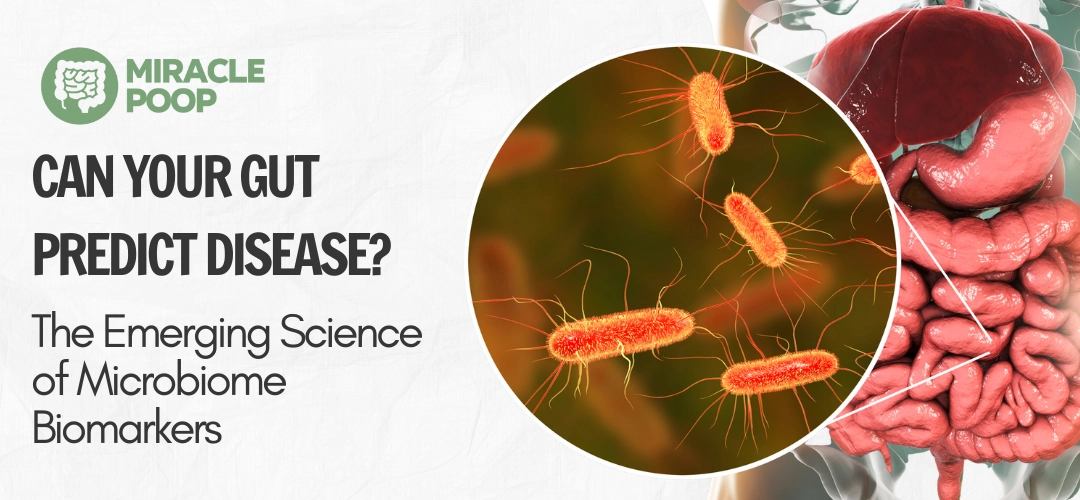Can Your Gut Predict Disease? The Emerging Science of Microbiome Biomarkers
In recent years, the phrase “trust your gut” has taken on a startlingly literal meaning in medical science. Long considered a silent partner in health, the human gut is now emerging as a powerful predictor of disease, thanks to a rapidly advancing field: microbiome biomarkers research. The question is no longer whether the gut influences our health, but whether it can offer early warning signs for conditions that traditional diagnostics may miss.

The Microbiome Biomarkers: More Than Just Digestion
The human gut is home to trillions of microorganisms (bacteria, viruses, fungi, and archaea) collectively known as the gut microbiome. These organisms aren’t freeloaders; they play critical roles in digesting food, regulating the immune system, synthesizing vitamins, and even influencing mood and cognition through the gut-brain axis.
But perhaps the most groundbreaking discovery in the last decade is that imbalances or specific patterns in the microbiome can signal the presence (or the likelihood) of disease. This has opened a new frontier in preventative health: the search for microbiome biomarkers.

What Are Microbiome Biomarkers?
A biomarker is a measurable indicator of a biological state or condition. In the context of the microbiome, this could be a particular strain of bacteria (or its absence), a metabolite produced by microbes, or even a pattern of gene expression within microbial DNA.
Researchers are now mapping these biomarkers to diseases ranging from inflammatory bowel disease (IBD) to type 2 diabetes, Parkinson’s, depression, and even certain cancers. A single stool sample can, in some cases, provide a snapshot of a person’s current and potential future health.
From Gut to Diagnosis: How the Science Works
The process begins with high-throughput DNA sequencing, which identifies and quantifies microbial species in the gut. Next comes bioinformatic analysis, where machine learning models detect correlations between microbial patterns and specific diseases.
For example:
- Low levels of Faecalibacterium prausnitzii have been linked to Crohn’s disease.
- An overgrowth of certain Clostridium species may point to colorectal cancer risk.
- Specific microbial metabolites are being studied as early indicators of Alzheimer’s disease or metabolic disorders.
This doesn’t just help with early detection, it also opens the door to personalized treatment. If doctors know which microbes are missing or overactive, they can potentially restore balance using diet, prebiotics, probiotics, or even fecal microbiota transplantation (FMT).

Potential Breakthroughs on the Horizon – Microbiome Biomarkers
While we’re still early in the journey, the trajectory is promising. Clinical trials are underway to validate microbiome-based diagnostic tools for:
- Early cancer screening
- Prediction of autoimmune flare-ups
- Personalized drug responses
- Mental health conditions tied to neuroinflammation
Moreover, companies are already offering consumer-grade gut tests that give people insights into their microbial profiles. While not yet FDA-approved for disease prediction, these tools hint at a future where routine health screening may begin in the bathroom, not the blood lab.
Challenges and Ethical Questions
As with any emerging science, caution is warranted. The microbiome is highly individual and influenced by diet, environment, genetics, and even geography. What constitutes a “healthy” microbiome for one person might look different for another. Overinterpreting data could lead to false alarms or missed diagnoses.
There are also privacy and ethical concerns. Microbiome data is deeply personal and potentially identifiable. As gut-based diagnostics grow in popularity, questions about data security, consent, and health insurance implications will come to the fore.

The Gut as a Crystal Ball?
It’s tempting to view the microbiome as a crystal ball for future illness. While we’re not quite there yet, the potential is undeniable. As technology improves and our understanding deepens, we’re inching closer to a world where gut data could guide personalized, preventative medicine with unprecedented precision.
So, can your gut predict disease? Not with absolute certainty yet. But it may soon become one of your most powerful allies in staying healthy.
Welcome to our gut health blog, your go-to source for expert-backed content on digestion, probiotics, prebiotics, and microbiome therapies like FMT. Whether you’re looking to understand the science behind gut health or searching for real stories and natural tips to heal your digestive system, you’ll find it all here. Start exploring our curated articles written to help you improve your gut naturally.
